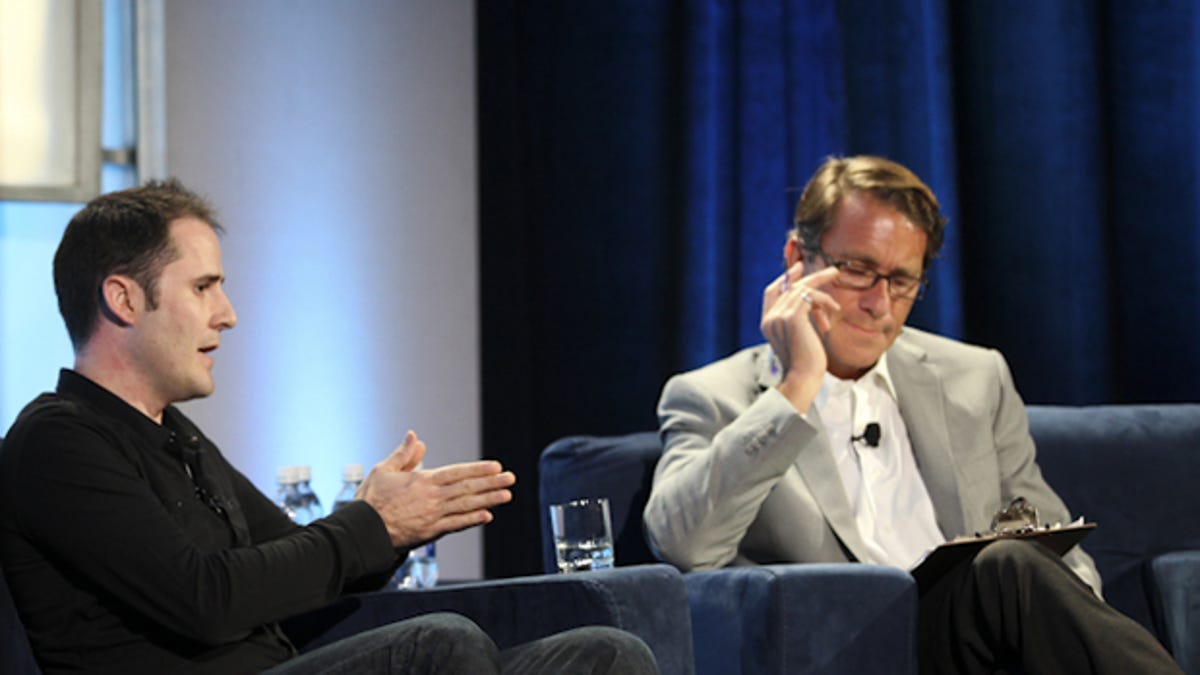Not much to tweet about in Twitter CEO talk
Evan Williams takes the stage at the Web 2.0 Summit but didn't disclose anything new about its revenue plans or new features--just the revelation that he used to have a really bad haircut 15 years ago.

SAN FRANCISCO--In anticipation of an onstage interview with Twitter CEO Evan Williams at the Web 2.0 Summit on Tuesday afternoon, conference organizer and Federated Media CEO John Battelle told the audience to expect "a surprise" during the talk.
Turns out that "surprise" was actually a recently unearthed video clip of Williams in 1994, explaining the Internet on behalf of a company called Illumination Labs and sporting a haircut that looked like it belonged on the set of '90s alterna-teen flick "Empire Records." (No, we don't have a snapshot of it yet.)
Williams didn't really say a whole lot else about where Twitter's going, beyond what the world already knows: it's been growing fast. It turned down a buyout offer from Facebook. It just raised a ton of money. It still hasn't disclosed a long-term revenue model.
"It's not like we're spending our days looking in the couch cushions for the elusive revenue model, but obviously we've done a lot of thinking about it," Williams said, declining to comment on the potential of search deals with Google or Microsoft. "I can't tell you exactly what the model is, but it's pretty obvious to you that there may be some advertising that makes sense...there's a lot of commercial activity on Twitter today, there's a lot of brand marketers who use Twitter today, and it works. We think of Twitter (as) not a social network, it's an information network...a substantial part of that is commercial and theoretically monetizable information."
Williams, who previously founded Pyra Labs and sold its flagship Blogger product to Google, took over as CEO of Twitter from fellow co-founder Jack Dorsey last year. Dorsey, who remains Twitter chairman, is working on a new mobile commerce start-up called Square.
In his talk at Web 2.0 Summit, Williams mentioned new features like user-generated "lists," currently in beta, and said that they may end up replacing the site's current (and much-maligned) "suggested user" list altogether. ("It's gone on too long, and I desperately want to kill it or evolve it.") He also said that "some things we're launching" may counteract recent slowdowns in Twitter's U.S. Web-based traffic, which was growing exponentially not so long ago.
"We are seeing slowing of growth in some areas and accelerating growth in other areas. Twitter is very hard to measure, even for us," Williams said. "The biggest two areas that we're seeing growth is on mobile and internationally." Last week, the company inked new mobile deals in India and Japan; currently, its five biggest markets are the U.S., the U.K., Japan, Brazil, and Indonesia, which has been "growing like crazy lately."
So what does he think of the other players in the real-time Web? He's not sure what to make of Google Wave ("I sure as hell don't know what Google Wave is going to be. I haven't wrapped my head around it yet") but underscored that in Twitter's early days he wasn't sure what that would turn out to be either. And as for Facebook, he shrugged off speculation that the social-networking giant started aping Twitter when it was unable to actually buy it.
"I don't know how Facebook's feature prioritization works. I suspect that they came to a lot of the same conclusions we did," Williams said. "In the global sense, I'm pretty sure the world is big enough for Facebook and Twitter, and fundamentally I think they're good at different things. Facebook is phenomenal at communications among people who know each other."
Facebook ultimately purchased a far smaller streaming-information start-up, FriendFeed, this summer.
"We had a few conversations with our friends in Palo Alto (Facebook) and ultimately I just didn't see a reason to sell if that opportunity would have presented itself because it's not the point," he continued regarding the failed acquisition. "The point is really to see what we can build. We believe very strongly in that at Twitter, and enabling the open exchange of information is a good thing for the world."
It's his usual schpiel. Aside from the Nirvana-era haircut, there wasn't a whole lot to tweet about here.

